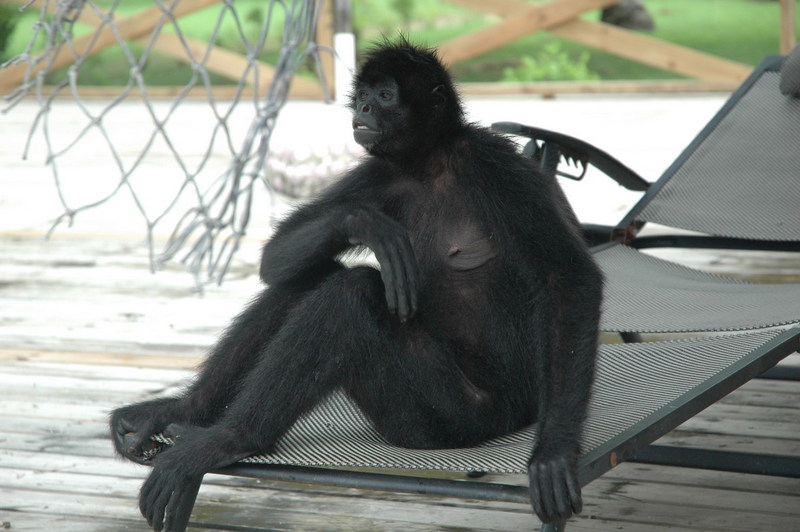|
| 질의: black spider monkey | 결과: 19번째/33 | |
Spider Monkey (Ateles sp.) - Wiki
| 제목: | Spider Monkey (Ateles sp.) - Wiki
| |

| 해상도: 1203x800
파일크기: 220624 Bytes
촬영일: 2006:07:20 17:41:08
사진기: NIKON D70 (NIKON CORPORATION)
F number: f/4.4
Exposure: 10/3500 sec
Focal Length: 700/10
등록시간: 2007:08:10 17:52:33
|
Spider monkey
From Wikipedia, the free encyclopedia
[Photo] Panamanian Spider Monkey (Ateles geoffroyi panamensis). Date: 20 July 2006
Spider monkeys are New World monkeys of the family Atelidae, subfamily Atelinae. Found in tropical forests from southern Mexico to Brazil, spider monkeys belong to the genus Ateles; the closely related woolly spider monkeys, are in the genus Brachyteles.
As they require large tracts of undisturbed forest and specialize on ripe fruits, spider monkeys may be considered an indicator species; the monkeys are threatened by habitat destruction through continued growth in South American agriculture.
A recent comparative intelligence comparison gives spider monkeys a value a little above gorillas, so it is reasonable to believe that spider monkeys are among the most intelligent New World monkeys.[2]
Physical description
Disproportionately long, spindly limbs inspired the spider monkey's common name. Their deftly prehensile tails, which may measure up to 89 centimetres, have highly flexible hairless tips complete with skin grooves similar to fingerprints; this adaptation to the spider monkey's strictly arboreal lifestyle grants the monkeys a fifth hand of sorts. Adults reach an average body length of 20 inches and a weight of 6.4 kilograms.
Spider monkeys have hook-like, narrow and thumbless hands; the fingers are elongated and recurved. The hair is coarse, ranging in colour from a ruddy gold to brown and black; the hands and feet are usually black. Heads are small with hairless faces. An unusually long labia in females may be mistaken for a penis; its function is unclear.
There is speculation that the alleged Loys's Ape is actually a large spider monkey, but this is still a matter of intense debate amongst cryptozoologists.
Behaviour and reproduction
Forming loose groups of 15-25 individuals, spider monkeys are highly agile; they are said to be second only to the gibbons in this respect. During the day, spider monkey groups break up into smaller subgroups of 2-8 individuals; this social structure ('fission-fusion') is found in only one other primate, the chimpanzee. The size of subgroups and the degree to which they will avoid each other during the day is determined by food competition and the risk of predation. Also less common in primates, females rather than males disperse at puberty to join new groups. Males tend to stick together for their whole life. Hence males in a group are more likely to be related and have closer bonds than females. The strongest social bonds are formed between females and young offspring.
Spider monkeys are diurnal and spend the night in carefully selected sleeping trees. Groups are thought to be directed by a lead female who is responsible for planning an efficient route for the day's feeding activities. Grooming is not as important to social interaction, due perhaps to a lack of thumbs.
Spider monkeys mate year round. The female monkey chooses a male from her group with whom to mate. Both male and female spider monkeys sniff their mates to check their readiness for copulation. This process is known as “anogenital sniffing.” On average, only one offspring at a time is produced from each female. The gestation period for spider monkeys ranges from 226 to 232 days.
For the first four months of life, baby spider monkeys cling to their mother's belly. Soon after, they climb to her back, eventually developing enough independence to travel on their own. Male spider monkeys have nothing to do with the raising of offspring.
At 107 grams, the spider monkey brain is actually twice the size of a howler monkey's of equivalent body size; this is thought to be a result of the spider monkeys' complex social system as well as their diet, which consists primarily of ripe fruit from a wide variety (over 150 species) of plants. The slow rate of development in spider monkeys may also play a role, females giving birth once every 3-4 years. Spider monkeys may live for 20 years or more.
Family Atelidae
Subfamily Atelinae
Red-faced Spider Monkey, Ateles paniscus
White-fronted Spider Monkey, Ateles belzebuth
Peruvian Spider Monkey, Ateles chamek
Brown Spider Monkey, Ateles hybridus
White-cheeked Spider Monkey, Ateles marginatus
Black-headed Spider Monkey, Ateles fusciceps
- Brown-headed Spider Monkey, Ateles fusciceps fusciceps
- Colombian Spider Monkey, Ateles fusciceps rufiventris
Geoffroy's Spider Monkey, Ateles geoffroyi
- Yucatan Spider Monkey, Ateles geoffroyi yucatanensis
- Mexican Spider Monkey, Ateles geoffroyi vellerosus
- Ateles geoffroyi geoffroyi
- Ornate Spider Monkey, Ateles geoffroyi ornatus
- Hooded Spider Monkey, Ateles geoffroyi grisescens
http://en.wikipedia.org/wiki/Spider_monkey
| The text in this page is based on the copyrighted Wikipedia article shown in above URL. It is used under the GNU Free Documentation License. You may redistribute it, verbatim or modified, providing that you comply with the terms of the GFDL. |
|
댓글 |
|---|
| | 손님 |
|
| Hello! Good Site! Thanks you! uqxpmnedazqoj |
| | MOHAMED HEKTIK LEBO |
|
| i wana lick that nipple ohh yeh baby. IM MOHAMED FROM 10A GLENEAGLES LOLLLL |
| | rusty shackleford |
|
| uh huh, me too, lick lick, mmm tasty! |
^o^
동물그림창고 똑똑전화 누리집
^o^
|
|
|

